- Center on Health Equity & Access
- Clinical
- Health Care Cost
- Health Care Delivery
- Insurance
- Policy
- Technology
- Value-Based Care
Americans' View on Government-Run Healthcare Is Changing
A small majority (51%) of US adults now believe that the federal government has a responsibility to ensure all Americans have health insurance coverage.
A small majority (51%) of US adults now believe that the federal government has a responsibility to ensure all Americans have health insurance coverage, according to the results of a Gallup survey. This is the first time since 2008 that a majority has said this.
President Barack Obama’s Affordable Care Act (ACA) has made the issue of the government’s role in healthcare coverage more divisive. In 2009, as the president worked to enact the ACA, which was passed by Congress in 2010, Americans were evenly split on the matter before shifting to the viewpoint that the government was not responsible for healthcare coverage.
However, in the year’s leading up to the ACA, there was much stronger support from Americans who believed healthcare coverage was the government’s responsibility.

Americans who approve of the ACA are more than 3 times as likely as those who disapprove of the ACA to say the government should have a role in ensuring healthcare coverage. In addition, nonwhites, 18 to 29 year olds, Democrats and those who lean Democrat, and low-income households are more likely to say the healthcare coverage is the government’s responsibility.
“Although U.S. adults lean toward the view that the government should ensure all Americans have healthcare coverage, they do not endorse a government-run system, which exists in most other Western nations,” wrote Gallup’s Justin McCarthy.
More than half (55%) say they prefer the current system, which is mostly based on private insurance, and only 41% would prefer a government-run system. However, these views may be changing. The percentage of Americans preferring the current system is down form 61% in 2014 and is at a 5-year low, while those preferring a government-run system is up from 35% in 2014, and is at a 5-year high.
“These data are important to monitor as Obama leaves office, especially because the fate of the healthcare law may depend on the outcome of the 2016 presidential election,” McCarthy concluded. “Its existence is all but assured if a Democrat wins, but is far less certain if a Republican is elected.”
